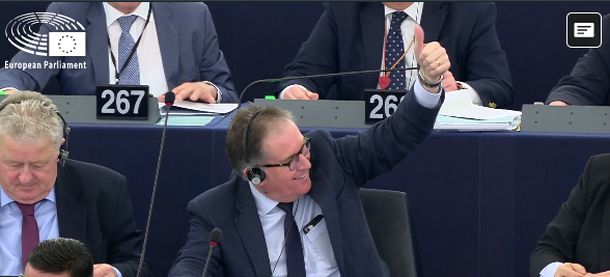"We have still time to influence so that the waters offshore Western Sahara are left outside of the agreement", writes columnist Helena Olsson in Finland's largest newspaper, Helsingin Sanomat, on the unethical EU fisheries.
Opinion in Helsingin Sanomat
20 December 2010
By Helena Olsson.
The columnist is a Swedish freelance writer, who is following the development of Western Sahara and Mauritania. She has previously been working in the Nordic Africa Institute –research center in Uppsala.
Unofficial translation from Finnish by Western Sahara Resource Watch.
According to a Saharawi human rights’ defender, Aminatou Haidar, her people are not profiting from the fisheries’ agreement between European Union and The Kingdom of Morocco.
"Unfortunately the agreement only intensifies the oppression conducted by Morocco", Haidar stated a year ago. Haidar was awarded e.g. Robert F. Kennedy Human Rights’ Award as well as American Civil Courage Prize.
The fisheries’ agreement was signed in 2006, and soon it’s about time to begin renegotiating. The current agreement grants EU to fish with 119 vessels offshore Western Sahara. Around 100 of those are Spanish. The EU has paid Morocco 36.1 million Euros for the fishing licenses.
The soil of the Moroccan occupied Western Sahara consists mainly of desert. Due to the fisheries’ agreement the possibilities for Western Sahara to gain independence has escaped further away. This increases frustration among both the inhabitants of the refugee camps lead by the independence movement the Polisario Front (in the Algerian region of Tindouf) and the population living in Western Sahara.
According to international law these people should be profiting economically from the natural resources of their land, while the fact being they haven’t been consulted on how to use the funds given by the EU.
In October the Moroccan soldiers shot to death a 14 year old Saharawi boy, who participated in the protest organized in the outskirts of the biggest city of Western Sahara, El Aiún. The soldiers violently destroyed the protest camp, which was inhabited by over 20 000 people. During the incidents some ten people died and several hundreds were injured or disappeared.
Escalating riots and loud calls of the supporters of the independence movement for the reinitiation of the fight against the occupier, after 19 a years’ cease fire, are not the only factors threatening the peace of the area. The risk that the conflict will spread to the whole Maghreb area is real due to instability in Western Sahara’s neighbour to the South, Mauritania.
Also UN-led-negotiations are being held for the future of Western Sahara. They aim to achieve agreement upon the conditions of upon which a referendum for self-determination can take place. . These negotiations have been regularly held on different levels since the cease fire in 1991. Only few still believe that the negotiations would be productive. The Personal Envoys of the UN Secretary General have changed often.
UN has decided not to urge the EU to stall making an agreement with Morocco concerning the waters of Western Sahara. The decision was made despite the opinion of the UN’s own Under-Secretary-General for Legal Affairs who in 2002 criticized the fact that the occupier is exploiting the natural resources belonging to original people of the area.
International law doesn’t always go hand in hand with the realpolitik – and especially not with its economical part.
An inexpensive fisheries’ agreement can, of course, be regarded as successful economic policy in the short term, but in the long term the situation may change, since the agreement is ignoring the right of the occupied people to exploit their own natural resources.
Particularly dispossessed of the benefits is the original population in Western Sahara, the Saharawis. At the same time the oppression towards the Saharawis is increasing.
The conduct of the EU so far shows that it is not willing to defend human rights as consistently as we would like to believe.
The fisheries’ agreement with Morocco has gained quite unanimous support in the upper level of decision making bodies in the EU. Among the rare critics is Sweden, which was the sole Member State to vote a lone against the agreement.
Many MEPs, from different countries, have insisted that the waters belonging to Western Sahara need to be excluded from the agreement. Also the lawyers of European Parliament have assessed the agreement to be in violation of international law, because the agreement does not show how the Saharawis are benefiting.
However defending human rights – in this case the rights of the Saharawis – demands more power to be backed up.
Spain and France are driving so strongly their interests that it’s unlikely they would be able to defend international law. However, the economical benefit for many other EU countries is much smaller, thus one would expect them to demand loudly the termination of the fisheries’ agreement.
The Nordic countries could act together in this case outside the official EU system. The fisheries’ agreement also carries another concern apart from human rights; the environment. Over-fishing threatens to destroy these coast waters, which are currently among the wealthiest in the world.
Also Norway has taken a clear position in the dispute. The government of Norway has urged Norwegian companies not to invest to Western Sahara. Furthermore Norwegian companies have been urged not to buy products from the area. This has led to concrete actions: many companies have resigned their agreements.
In the Nordic countries, there are groups of parliamentarians, representing a range of parties, who are devoted to contribute to the situation in Western Sahara. In order to reach concrete results, the governments should also take a clear stance for international law and human rights.
The current fisheries’ agreement will terminate at the end of March 2011. There’s not yet a decision on the new agreement. It means that we still have time to influence and thereby ensure that the waters off the shores of Western Sahara are left outside of the agreement.
Here is the EU Council's legal advice on fishing in occupied waters
Hans Corell criticizes EU fisheries in Western Sahara
The former Legal Counsel to the UN Security Counsel, Mr. Hans Corell, comments on the EU's fisheries activities in Western Sahara.
EU Court reaffirms position on Western Sahara
Polisario has a case, but it should be pursued when the time is right, Court implies.
European Parliament disregards Court and adopts Morocco fish deal
Notwithstanding four consecutive rulings of the EU's highest Court calling such a practice illegal, the European Parliament has just now voted in favour of the EU-Morocco Fisheries Agreement that will be applied to the waters of occupied Western Sahara.


